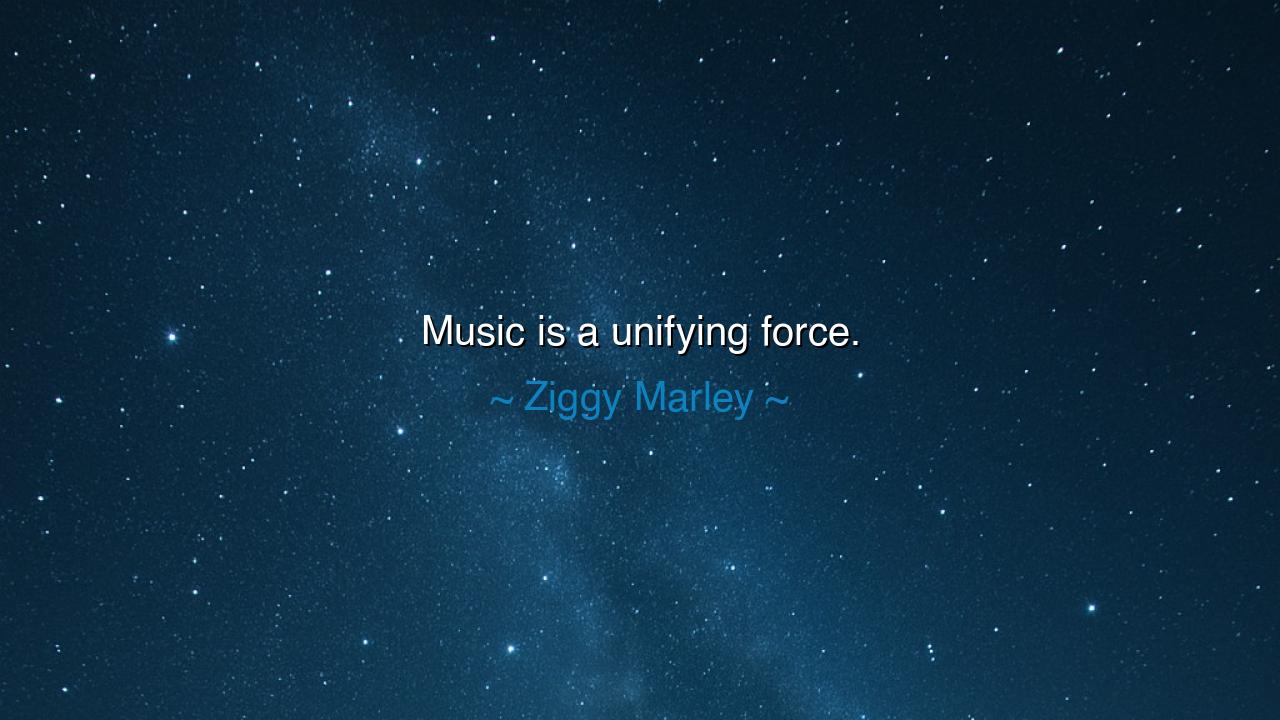
Music is a unifying force.






When the son of a prophet, Ziggy Marley, declared, “Music is a unifying force,” he spoke as one carrying forward the sacred fire lit by his father. These words are not light, nor casual, but heavy with the weight of truth. For in every age, in every land, music has bound together those divided by tongue, by color, by creed, by power. Where walls stand, music breaks them; where nations quarrel, music builds bridges; where hearts are wounded, music heals. It is the invisible thread that ties soul to soul, weaving many into one.
The ancients knew this mystery well. In Greece, it was said that Orpheus could charm wild beasts, bend trees, and even soften the hearts of gods with his lyre. His music was not mere sound, but a force that unified nature itself. Likewise, tribes in Africa gathered around the drum, their voices rising in chorus, each man and woman separate yet united in one rhythm. Thus Ziggy Marley’s words are not new, but timeless: music is a unifying force because it speaks the language deeper than speech—the language of the heart.
History, too, offers shining proof. During the American Civil Rights Movement, songs such as We Shall Overcome became the heartbeat of unity. Black and white, rich and poor, believer and doubter—voices rose together in harmony. The song did not erase difference, but it wove them into a single fabric of resistance and hope. Even in fear, even in struggle, the melody carried courage, binding individuals into a mighty people who could not be silenced. Here we see the power Marley speaks of: music uniting the weak into strength, the scattered into one.
Consider also the story of the Berlin Wall. For decades, it divided a people with concrete and barbed wire. Yet in 1989, when David Hasselhoff sang Looking for Freedom near the wall, tens of thousands joined in chorus. Shortly after, the wall fell. Was it politics that truly brought it down, or was it the sound of voices united in song? Perhaps both, but surely music played its role as the unifying cry of a people demanding to be one again.
Ziggy Marley’s own heritage proves this truth. His father, Bob Marley, sang songs like One Love and Redemption Song, and through them, people across nations and religions found common ground. Bob’s words and rhythms transcended borders, so that a fisherman in Jamaica and a student in Europe could both claim his music as their own. Ziggy, inheriting this legacy, speaks from experience when he tells us that music unites—it does not ask where you were born, but simply asks: do you feel this truth?
The meaning is clear: in a world torn by division, music reminds us that beneath the differences, we share the same heartbeat. It strikes at something primal and eternal, awakening the recognition that we are one family of earth. When we sing together, there is no enemy, no stranger, no other—there is only us, bound by sound, carried by rhythm. Music is the weapon of peace, the anthem of unity, the force that no tyranny can silence.
The lesson for us is profound: if you wish to build bridges, let music guide you. Listen to the songs of other cultures, and you will find yourself drawn into their stories. Share your own songs, and you give others a glimpse of your soul. When anger divides, let music soften; when despair grips, let music lift. Do not treat it as mere entertainment, but as a sacred gift, capable of shaping the world.
Therefore, let us take Ziggy Marley’s words as a commandment for our time: “Music is a unifying force.” In a fractured world, let us sing together, play together, listen deeply, and allow the rhythm of life to bind us as one. For while armies may divide, and leaders may deceive, the song of the people rises pure, eternal, and indestructible. And in that song, we find our unity.






AAdministratorAdministrator
Welcome, honored guests. Please leave a comment, we will respond soon